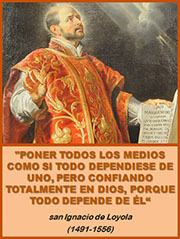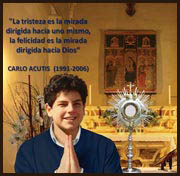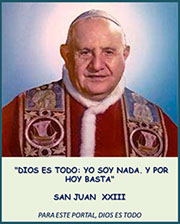
Pope John Paul II Speaks on Charisms
General Audience March 9, 1994
The Holy Spirit, the giver of every gift and the main principle of the Church's vitality, does not only work through the sacraments. According to St. Paul, he who distributes to each his own gifts as he wills (1 Cor. 12:11), pours out into the People of God a great wealth of graces both for prayer and contemplation and for action.
They are charisms: lay people receive them too, especially in relation to their mission in the Church and society. The Second Vatican Council stated this in connection with St. Paul: "The Holy Spirit also distributes special graces among the faithful of every rank. By these gifts he makes them fit and ready to undertake various tasks and offices for the
renewal and building up of the Church, as it is written (in St. Paul): 'the manifestation of the Spirit is given to everyone for profit.' (1 Cor. 12.7)
St. Paul highlighted the multiplicity and variety of charisms in the early Church: some are extraordinary, such as healings, the gift of prophecy or that of tongues; others are simpler, given for the ordinary fulfillment of the tasks assigned in the community.
As a result of Paul's text, charisms are often thought of as extraordinary gifts, which primarily marked the beginning of the life of the Church. Vatican Council II called attention to charisms in their quality as gifts belonging to the ordinary life of the Church and not necessarily having an extraordinary or miraculous nature. In addition, it should be kept in mind that the primary or principle aim of many charisms is not the personal sanctification of those who receive them, but the service of others and the welfare of the Church... in that it concerns the growth of Christ's Mystical Body.
As St. Paul told us and the Council repeated, these charisms result from the free choice and gift of the Holy Spirit. In a special way the Triune God shows his sovereign power in the gifts. This power is not subject to any antecedent rule, to any particular discipline or to a plan of interventions established once and for all. According to St. Paul, he distributes his gifts to each "as he wills" (1 Cor. 12:11) It is an eternal will of love, whose freedom and gratuitousness is revealed in the action carried out by the Holy Spirit--Gift in the economy of salvation. Through this sovereign freedom and gratuitousness, charisms are also give to the laity, as the Church's history shows.
We cannot but admire the great wealth of gifts bestowed by the Holy Spirit on lay people as members of the Church in our age as well. Each of them has the necessary ability to carry out the tasks to which he is called for the welfare of the Christian people, and the work's salvation, if he is open, docile, and faithful to the Holy Spirit's action.
Diversity and unity of charisms:Need to recognize and discern them
However, we must also turn our attention to another aspect of St. Paul's teaching and that of the Church, an aspect that applies to every type of ministry and to charisms: their diversity and variety cannot harm unity. "There are different gifts but the same Spirit; there are different ministries but the same Lord." (1 Cor. 12:4-5) Paul asked that these differences be respected because not everyone can expect to carry out the same role contrary to God's plan and the Spirit's gift and contrary to the most elementary laws of any social structure. However, the Apostle equally stressed the need for unity, which itself answers a sociological demand, but which in the Christian community should even more be a reflection of the divine unity. One Spirit, One Lord.
Thus, one Church!
At the beginning of the Christian era extraordinary things were accomplished under the influence of charisms, both extraordinary ones and those which could be called little, humble, everyday charisms. This has always been the case in the Church and is so in our era as well, generally in a hidden way, but sometimes in a striking way, when God
desires it for the good of his Church.
In our day, as in the past, a great number of lay people have contributed to the Church'sspiritual and pastoral growth. We can say that today too there are many lay people who, because of their charisms, work as good, genuine witnesses of faith and love... out of fidelity to a holy vocation, who are involved in serving the common good, in establishing justice, in improving the living conditions of the poor and needy, in taking care of the disabled, in welcoming refugees and in achieving peace throughout the world. In the community life and pastoral practice of the Church, charisms must be recognized but also discerned, as the Synod Fathers recalled in 1987.
Certainly, the Spirit blows where he wills; one can never expect to impose rules and conditions on him. The Christian community, though, has the right to be informed by its Pastors about the authenticity of charisms and the reliability of those who claim to have received them. The Council recalled the need for prudence in this area, especially when it
regards extraordinary charisms.
The Apostolic Exhortation Christifideles Laici also stressed the "no charism dispenses a person from reference and submission to the Pastors of the Church." These norms of prudence are easily understandable and apply to all, both clerics and lay people. That having been said, we would like to repeat with the Council and the Exhortation cited above the "charisms should be received in gratitude both on the part of the one who receives them, and also on the part of the entire Church." For these charisms there arises "for each of the faithful the right and duty of exercising them for the good of men and for building up the Church."



Iglesiaehistoria.com | Querétaro, México | 2017
Todos los Derechos Reservados